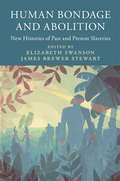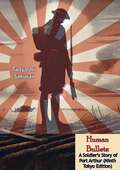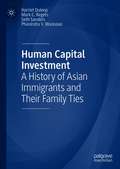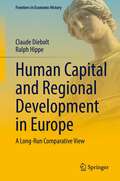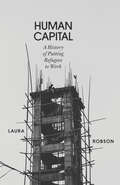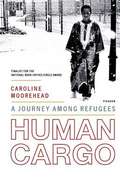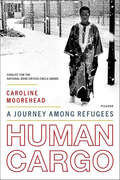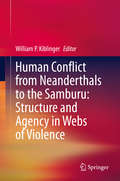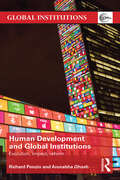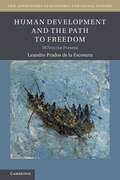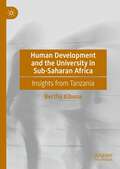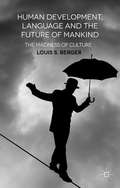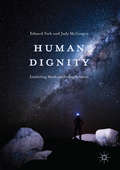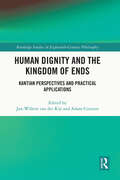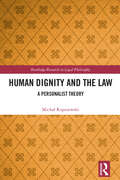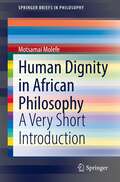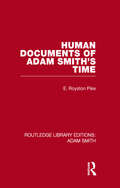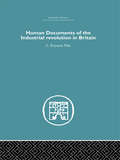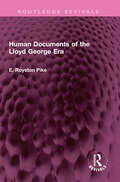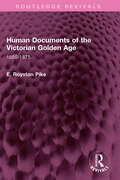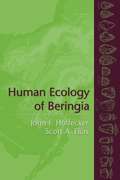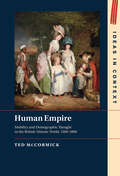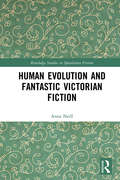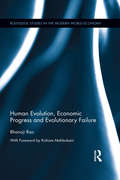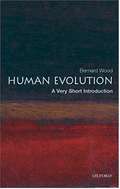- Table View
- List View
Human Bondage and Abolition: New Histories of Past and Present Slaveries (Slaveries since Emancipation)
by Elizabeth Swanson James Brewer StewartSlavery's expansion across the globe often escapes notice because it operates as an underground criminal enterprise, rather than as a legal institution. In this volume, Elizabeth Swanson and James Brewer Stewart bring together scholars from across disciplines to address and expose the roots of modern-day slavery from a historical perspective as a means of supporting activist efforts to fight it in the present. They trace modern slavery to its many sources, examining how it is sustained and how today's abolitionists might benefit by understanding their predecessors' successes and failures. Using scholarship also intended as activism, the volume's authors analyze how the history of African American enslavement might illuminate or obscure the understanding of slavery today and show how the legacies of earlier forms of slavery have shaped human bondage and social relations in the twenty-first century.
Human Bullets: A Soldier's Story of Port Arthur (Ninth Tokyo Edition)
by Tadyoshi SakuraiTadyoshi Sakurai’s Human Bullets: A Soldier's Story of Port Arthur is a gripping firsthand account of the Russo-Japanese War (1904–1905), offering an unflinching look at the brutal realities of warfare. Written by a Japanese officer who fought in the Siege of Port Arthur, this memoir provides a rare and vivid perspective on one of the most significant military campaigns of the early 20th century.Sakurai’s narrative captures the courage, sacrifice, and unyielding spirit of the Japanese soldiers as they faced overwhelming odds in their quest to seize the heavily fortified Russian stronghold of Port Arthur. Through his candid descriptions, he conveys the physical and emotional toll of the battlefield, detailing the grueling assaults, the devastating losses, and the camaraderie among his comrades. The title, Human Bullets, reflects the soldiers’ unwavering dedication and willingness to serve as the very instruments of their nation’s military strategy.Beyond the harrowing combat scenes, Sakurai reflects on the larger themes of loyalty, patriotism, and the human cost of war. His writing is both raw and poignant, offering insights into the mindset of a soldier shaped by duty and honor.Human Bullets is not only a historical document but also a powerful anti-war statement that underscores the futility and tragedy of conflict. It remains a valuable resource for historians, military enthusiasts, and anyone seeking to understand the complexities of war from a deeply personal perspective.
Human Capital Investment: A History of Asian Immigrants and Their Family Ties
by Phanindra V. Wunnava Harriet Duleep Mark C. Regets Seth SandersIn 1965, a family-reunification policy for admitting immigrants to the United States replaced a system that chose immigrants based on their national origin. With this change, a 40-year hiatus in Asian immigration ended. Today, over three-quarters of US immigrants originate from Asia and Latin America. Two issues that dominate discussions of US immigration policy are the progress of post-reform immigrants and their contributions to the US economy. This book focuses on the earnings and human capital investment of Asian immigrants to the US after 1965. In addition, it provides a primer on studying immigrant economic assimilation, by explaining economists’ methodology to measure immigrant earnings growth and the challenges with this approach. The book also illustrates strategies to more fully use census data such as how to measure family income and how to use “panel data” that is embedded in the census. The book is a historical study as well as an extremely timely work from a policy angle. The passage of the 1965 Immigration and Nationality Act set the United States apart among economically developed countries due to the weight given to family unification. Based on analyses by economists—which suggest that the quality of immigrants to the US fell after the 1965 law—policymakers have called for fundamental changes in the US system to align it with the immigration systems of other countries. This book offers an alternative view point by proposing a richer model that incorporates investments in human capital by immigrants and their families. It challenges the conventional model in three ways: First, it views the decline in immigrants’ entry earnings after 1965 as due to investment in human capital, not to permanently lower “quality.” Second, it adds human capital investment and earnings growth after entry to the model. And finally, by taking investments by family members into account, it challenges the policy recommendation that immigrants should be selected for their occupational qualifications rather than family connections.
Human Capital and Regional Development in Europe: A Long-Run Comparative View (Frontiers in Economic History)
by Claude Diebolt Ralph HippeHuman capital is of utmost importance for the future of our knowledge economies and societies. However, it is unequally distributed in Europe, contributing to marked spatial patterns of economic prosperity within and across countries. In many cases, these patterns have a long history. To understand them better, it requires to go back in time, when mass schooling was starting to become a reality across Europe. Taking a long-run perspective over more than 150 years, this book shows the development and the distribution of human capital in the regions of Europe and its connections with the economy. It provides insights into recent research findings in this area, including theoretical advances and the use of new empirical data.
Human Capital: A History of Putting Refugees to Work
by Laura RobsonHOW GLOBAL HUMANITARIANISM TURNS REFUGEES INTO CHEAP LABORHistorian Laura Robson unveils the dark heart of our purportedly humanitarian international regime. Tracing the century-long history of attempts to remake refugees into disposable migrant labor, Robson elucidates global humanitarianism&’s deep-seated commitment to refugee exploitation and containment.Surveying more than a hundred years of policy across the globe, Robson captures the travails of Balkan refugees in the late Ottoman Empire, Roosevelt&’s secret plans to use German Jewish refugees as laborers in Latin America, and contemporary European efforts to deploy Syrians as low-wage workers in remote regions of Jordan.The advent of internationalist refugee aid has long been told as an inspirational story in which reformers fought tirelessly for a system that would recognize and guarantee the rights of displaced and dispossessed people. But as Robson demonstrates, the motives behind modern refugee policy can be mercenary. Refugees have become easy prey for global industrial capitalism.
Human Cargo: A Journey Among Refugees
by Caroline MooreheadNational Book Critics Circle Award Finalist Traveling for nearly two years and across four continents, Caroline Moorehead takes readers on a journey to understand why millions of people are forced to abandon their homes, possessions, and families in order to find a place where they may, quite literally, be allowed to live. Moorehead's experience living and working with refugees puts a human face on the news, providing unforgettable portraits of the refugees she meets in Cairo, Guinea, Sicily, Lebanon, England, Australia, Finland, and at the U. S. -Mexico border. Human Cargo changes our understanding of what it means to have and lose a place in the world, and reveals how the refugee "problem" is on a par with global crises such as terrorism and world hunger.
Human Cargo: A Journey Among Refugees
by Caroline MooreheadAn arresting portrait of the lives of today's refugees and a searching look into their futureThe word refugee is more often used to invoke a problem than it is to describe a population of millions of people forced to abandon their homes, possessions, and families in order to find a place where they may, quite literally, be allowed to live. In spite of the fact that refugees surround us-the latest UN estimates suggest that 20 million of the world's 6.3 billion people are refugees-few can grasp the scale of their presence or the implications of their growing numbers.Caroline Moorehead has traveled for nearly two years and across four continents to bring us their unforgettable stories. In prose that is at once affecting and informative, we are introduced to the men, women, and children she meets as she travels to Cairo, Guinea, Sicily, the U.S./Mexico border, Lebanon, England, Australia, and Finland. She explains how she came to work and for a time live among refugees, and why she could not escape the pressing need to understand and describe the chain of often terrifying events that mark their lives. Human Cargo is a work of deep and subtle sympathy that completely alters our understanding of what it means to have and lose a place in the world.
Human Conflict from Neanderthals to the Samburu: Structure and Agency in Webs of Violence
by William P. KiblingerThis book examines human conflict throughout history, the reasons behind the struggles, and why it persists. The volume delves into the causes of human conflict and what can be done about them. Based on detailed descriptions that support insightful interpretations, the book explores significant historical events in the course of human history. By pursuing a “web of violence” approach, it raises and answers questions about the sources of conflict and how it may or may not be resolved through investigations into human agency and practice. It evaluates lessons learned concerning human conflict, violence, and warfare. To illustrate these lessons, the book presents a broad geographical and temporal set of data, including research on the time of Neanderthals in Europe (20-30 thousand years ago); the Late Neolithic civilization on the Mediterranean (6-8 thousand years ago); medieval Ireland; contemporary history of the Western Dani peoples of West Papua; and, finally, recent issues in Brazil, Congo, and Kenya.
Human Development and Global Institutions: Evolution, Impact, Reform (Global Institutions)
by Arunabha Ghosh Richard PonzioThis book provides a timely and accessible introduction to the foundational ideas associated with the human development school of thought. It examines its conceptual evolution during the post-colonial era, and discusses how various institutions of the UN system have tried to engage with this issue, both in terms of intellectual and technical advance, and operationally. Showing that human development has had a profound impact on shaping the policy agenda and programming priorities of global institutions, it argues that human development has helped to preserve the continued vitality of major multilateral development programs, funds, and agencies. It also details how human development faces new risks and threats, caused by political, economic, social, and environmental forces which are highlighted in a series of engaging case studies on trade, water, energy, the environment, democracy, human rights, and peacebuilding. The book also makes the case for why human development remains relevant in an increasingly globalized world, while asking whether global institutions will be able to sustain political and moral support from their member states and powerful non-state actors. It argues that fresh new perspectives on human development are now urgently needed to fill critical gaps across borders and entire regions. A positive, forward-looking agenda for the future of global governance would have to engage with new issues such as the Sustainable Development Goals, energy transitions, resource scarcity, and expansion of democratic governance within and between nations. Redefining the overall nature and specific characteristics of what constitutes human progress in an increasingly integrated and interdependent world, this book serves as a primer for scholars and graduate students of international relations and development. It is also relevant to scholars of economics, political science, history, sociology, and women’s studies.
Human Development and the Path to Freedom: 1870 to the Present (New Approaches to Economic and Social History)
by Leandro Prados de la EscosuraHow has human development evolved during the last 150 years of globalization and economic growth? How has human development been distributed across countries? How do developing countries compare to developed countries? Do social systems matter for wellbeing? Are there differences in the performance of developing regions over time? Employing a capabilities approach, Human Development and the Path to Freedom addresses these key questions in the context of modern economic growth and globalization from c.1870 to the present. Leandro Prados de la Escosura shows that health, access to knowledge, standards of living, and civil and political freedom can substitute for GDP per head as more accurate measures of our wellbeing.
Human Development and the University in Sub-Saharan Africa: Insights from Tanzania
by Bertha KibonaThis book utilises a human development and capability approach to examine the role of higher education in the context of Tanzania. The author considers decolonisation debates as they relate to African concerns in order to make a case for systems design and implementation implications for decolonising higher education institutions. The book will be of interest to students, scholars and policymakers in the field of higher education.
Human Development, Language and the Future of Mankind
by Louis S. BergerDrawing on and integrating unorthodox thought from a broad range of disciplines including clinical psychology, linguistics, philosophy, natural science and psychoanalysis, this book offers a provocative, original analysis of the global threats to our survival, and proposes a remedy.
Human Dignity
by Edward Sieh Judy McgregorThis book examines the concept of dignity from a variety of global perspectives. It scrutinizes how dignity informs policy and practice, and is influenced by international and domestic law, human rights values, and domestic politics. An exciting collection of essays, this edited volume provides an analysis of human rights as they are experienced by real people who have in many cases been forced to take action to further their own interests. Readers will discover an extensive range of issues discussed, from the internet, climate change and disabilities, to globalization, old-age, and migrants' rights. The last section deals with the impact of various issues on indigenous and migrant populations, specifically violence in Columbia, border issues in Tijuana, women's and children's rights violations, and the complex problems experienced by refugees, particularly in regards to citizenship. The interdisciplinary nature of this work makes it an invaluable read for scholars of Health Studies, Law, Human Rights, Sociology and Politics.
Human Dignity and the Kingdom of Ends: Kantian Perspectives and Practical Applications (Routledge Studies in Eighteenth-Century Philosophy)
by Adam Cureton Jan-Willem van der RijtThis book advances our understanding of the nature, grounds and limits of human dignity by connecting it with Kant’s notion of an ideal moral community, or "Kingdom of Ends". It features original essays by leading Kant scholars and moral and political philosophers from around the world. Although Kant’s influential injunction to treat humanity as an end in itself and never merely as a means has garnered the most attention among those interested in analyzing human dignity with a Kantian lens, Kant himself places much more emphasis on the Kingdom of Ends as crucial for defining human dignity. The chapters in this collection focus not only on interpretive issues related to the Kingdom of Ends but also on practical applications that have the potential to advance discussions about the nature and foundations of rights, the content of moral principles, the importance of moral ideals and attitudes and the nature of moral motivation. Exploring and connecting the ideas of human dignity and the Kingdom of Ends significantly deepens our moral understanding, advances discussions in moral and political philosophy and enhances our appreciation of Kant’s moral theory. Human Dignity and the Kingdom of Ends: Kantian Perspectives and Practical Applications will appeal to scholars and advanced students of Kant, moral philosophy, political philosophy, and political theory.
Human Dignity and the Law: A Personalist Theory (Routledge Research in Legal Philosophy)
by Michał RupniewskiThis book reassesses the relationship between human dignity, law, and specifically the ‘personalist’ school of agency. The work argues that a specific way of appreciating dignity is contained in how law understands the person, and so can be used to improve upon how we explain and interpret the law. Despite considerable differences between jurisdictions as regards human dignity in application, it is argued that the particular weight of human persons is the widely shared focal point. The central claim, therefore, is that the law recognises, and tries to foster, the status of personhood, and, drawing on the work of Karol Wojtyła, the author develops a ‘Status of Personhood Theory’. The book will be of interest to academics and researchers working in the areas of Legal Philosophy, Jurisprudence, Philosophy, Ethics and Political Theory.
Human Dignity in African Philosophy: A Very Short Introduction (SpringerBriefs in Philosophy)
by Motsamai MolefeThis book throws a spotlight on the under-explored African perspective on the mercurial concept of human dignity. To do so, it employs two strategies. In the first instance, it considers African theories of human dignity: (1) vitality; (2) community; (3) Personhood. Secondly, it explores the plausibility of these theories by applying them to select applied ethics themes, specifically: animal ethics, disability ethics and euthanasia. The aim of this book is not to argue for the plausibility of these African theories, but to familiarize the global audience of philosophy, ethics and related disciplines (legal studies, sociology, bioethics and so on) with a neglected African perspective on this vital concept. The books is aimed at scholars of philosophy interested in non-European and specifically African perspective.
Human Documents of Adam Smith's Time (Routledge Library Editions: Adam Smith)
by Edgar Royston PikeFirst published in 1974, this is not a ‘life’ of the founder of the science of economics, although it opens with a biographical sketch; nor is it an analysis of The Wealth of Nations, although it contains numerous pointed quotations from it. Rather, it is a presentation of Adam Smith against his background of time and place, eighteenth century Britain on the eve of the Industrial Revolution. The first chapter consists of ‘documents’ illustrating life in London: ‘low life’ be it noted, which is not to say that it is all sordidness and debauchery and crime (though there is plenty of that in evidence) but life as it was lived by the ‘lower orders’, whom Adam Smith gratefully recognises as ‘the great body of the people’. The last chapter describes the Scotland that Adam Smith knew – Kirkaldy, Glasgow and Edinburgh.
Human Documents of the Industrial Revolution In Britain
by E. Royston pikeFirst Published in 2005. Routledge is an imprint of Taylor & Francis, an informa company.
Human Documents of the Lloyd George Era (Routledge Revivals)
by E. Royston PikeFirst published in 1972, Human Documents of the Lloyd George Era presents the years when Lloyd George was in his prime, and his career in peace and war may be seen as the frame in which the ‘documents’ find their proper place; but the book’s real subject is not Lloyd George, it is the People, with whom he identified himself and spent his long life trying to serve. For the purpose of this book Lloyd George Era is taken as the period from 1905. The early documents enable us to reconstruct a vivid picture of life as it was lived ‘before the war’ by such people as London artisans, Middlesbrough ironworkers, Lancashire factory hands, Northumbrian pit-folk and farm labourers, while extracts from reports of the first ‘Lady Factory Inspectors’ and of the great Royal Commission on the Poor Law highlight the grim situation of the ‘Pauper Host’. With the outbreak of war, the mood changes, as Lloyd George leads the People in a massive war effort on the home front, producing munitions and trying to maintain normal industrial output. A glimpse is given of the various contributions made by women. Out of a vast mass of tiny details a picture emerges of an essentially peace- loving people joining forces to achieve what Lloyd George called ‘the bloodstained stagger’ to victory. This is an essential read for students of British history.
Human Documents of the Victorian Golden Age: 1850-1875 (Routledge Revivals)
by E. Royston PikeFirst published in 1967 Human Documents of the Victorian Golden Age presents a collection of ‘documents’, textual and pictorial, and human, illustrating and describing what the author calls, one of the most vigorous, vital, fertile periods in the history of the modern world. The material has been arranged in eight main chapters most of which have subdivisions. The first chapter has for its subject The Great Exhibition of 1851, and this is followed by life and labour, a series of picturesquely detailed description of London and the great industrial regions. Young England is concerned with the juvenile workers in factory and workshop. Next, we have the longest chapter in the book Queen Victoria's sisters containing number of documents describing the life of women in domestic service, the London dress factories and workshops, pit- banks and brickfields and in agriculture. Closely connected with this is home sweet home and then the chapter on the sanitary idea. Workers Unite! echoes Karl Marx but it has to do with the British working men who founded the modern trade union and cooperative movements. The last chapter talks about prostitutes and her clients and various environments in which the trade was carried on. This is an essential read for students of British history.
Human Ecology of Beringia
by John Hoffecker Scott EliasTwenty-five thousand years ago, sea level fell more than 400 feet below its present position as a consequence of the growth of immense ice sheets in the Northern Hemisphere. A dry plain stretching 1,000 miles from the Arctic Ocean to the Aleutians became exposed between northeast Asia and Alaska, and across that plain, most likely, walked the first people of the New World. This book describes what is known about these people and the now partly submerged land, named Beringia, which they settled during the final millennia of the Ice Age.Humans first occupied Beringia during a twilight period when rising sea levels had not yet caught up with warming climates. Although the land bridge between northeast Asia and Alaska was still present, warmer and wetter climates were rapidly transforming the Beringian steppe into shrub tundra. This volume synthesizes current research-some previously unpublished-on the archaeological sites and rapidly changing climates and biota of the period, suggesting that the absence of woody shrubs to help fire bone fuel may have been the barrier to earlier settlement, and that from the outset the Beringians developed a postglacial economy similar to that of later northern interior peoples.The book opens with a review of current research and the major problems and debates regarding the environment and archaeology of Beringia. It then describes Beringian environments and the controversies surrounding their interpretation; traces the evolving adaptations of early humans to the cold environments of northern Eurasia, which set the stage for the settlement of Beringia; and provides a detailed account of the archaeological record in three chapters, each of which is focused on a specific slice of time between 15,000 and 11,500 years ago. In conclusion, the authors present an interpretive summary of the human ecology of Beringia and discuss its relationship to the wider problem of the peopling of the New World.
Human Empire: Mobility and Demographic Thought in the British Atlantic World, 1500–1800 (Ideas in Context)
by Ted McCormickArguing that demographic thought begins not with quantification but in attempts to control the qualities of people, Human Empire traces two transformations spanning the early modern period. First was the emergence of population as an object of governance through a series of engagements in sixteenth- and seventeenth-century England, Ireland, and colonial North America, influenced by humanist policy, reason of state, and natural philosophy, and culminating in the creation of political arithmetic. Second was the debate during the long eighteenth century over the locus and limits of demographic agency, as church, civil society, and private projects sought to mobilize and manipulate different marginalized and racialized groups – and as American colonists offered their own visions of imperial demography. This innovative, engaging study examines the emergence of population as an object of knowledge and governance and connects the history of demographic ideas with their early modern intellectual, political, and colonial contexts.
Human Evolution and Fantastic Victorian Fiction (Routledge Studies in Speculative Fiction)
by Anna NeillFollowing the publication of Darwin’s On the Origin of Species, Victorian anthropology made two apparently contradictory claims: it distinguished "civilized man" from animals and "primitive" humans and it linked them though descent. Paradoxically, it was by placing human history in a deep past shaped by minute, incremental changes (rather than at the apex of Providential order) that evolutionary anthropology could assert a new form of human exceptionalism and define civilized humanity against both human and nonhuman savagery. This book shows how fantastic Victorian and early Edwardian fictions—utopias, dystopias, nonsense literature, gothic horror, and children’s fables—untether human and nonhuman animal agency from this increasingly orthodox account of the deep past. As they imagine worlds that lift the evolutionary constraints on development and as they collapse evolution into lived time, these stories reveal (and even occupy) dynamic landscapes of cognitive descent that contest prevailing anthropological ideas about race, culture, and species difference.
Human Evolution, Economic Progress and Evolutionary Failure (Routledge Studies in the Modern World Economy)
by Bhanoji RaoThis monograph is an innovative endeavour in many ways. First, it brings to the fore the synergy between human evolution and economic and social progress. Second, it acknowledges the critical contributions from the routine adherence to contextual truth and contextual non-violence of humanity at large. Finally, it argues that the world is sliding towards evolutionary failure by not moving further forward in the adherence to the two core human values. For all those interested in development in a holistic sense, the book will inspire thinking and debate. Human evolution will go on – one way or the other – with or without adherence to truth and non-violence. The book stresses the time is now, to go for the best and eschew the worst.
Human Evolution: A Very Short Introduction
by Bernard Wood"This Very Short Introduction traces the history of our understanding of human evolution - taking the reader right up to the very latest fossil findings and the debates about what they mean." "Providing an 'insider's view' of current paleoanthropology, Bernard Wood explains how human fossils are found, analyzed, and interpreted, and what the latest advances in genetics and a range of other sciences can reveal about our earliest origins."
